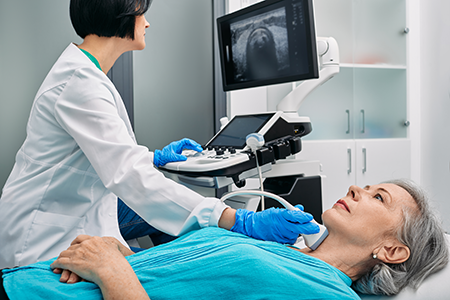The Basics of Thyroid Disease
 The thyroid is a butterfly-shaped gland at the base of the neck. This small gland produces very important hormones (T4, T3, and calcitonin) that are responsible for regulating many important processes in the body including, but not limited to:
The thyroid is a butterfly-shaped gland at the base of the neck. This small gland produces very important hormones (T4, T3, and calcitonin) that are responsible for regulating many important processes in the body including, but not limited to:
- Heart rate
- Blood pressure
- Body temperature
- Mood
- Menstrual cycles
- Weight
Around 20 million Americans are living with a thyroid disease and up to 60% of them are unaware of their condition¹, putting them at risk for serious complications like cardiovascular disease, osteoporosis, and infertility.
Talking about thyroid conditions with your friends and loved ones could help someone identify their condition and pursue the medical treatment they need.
The Different Types of Thyroid Diseases
Because the thyroid is a vital organ, it is important to understand the many different conditions that affect it. These are usually broken into two categories (primary or secondary) based on what is causing the disease.
Primary Thyroid Disease
A primary thyroid condition is when the thyroid itself is the cause of illness. Primary thyroid disorders can be caused by:
Autoimmune/inflammatory conditions
Autoimmune diseases are caused by the immune system attacking the body instead of protecting it. When the immune system targets the thyroid, this can lead to a primary thyroid disease. The most common autoimmune thyroid diseases are Hashimoto’s thyroiditis, Graves’ disease and IgG4 related thyroiditis.
Reactive conditions
Abnormal growth and inflammation can cause the thyroid gland to become enlarged. The most common reactive conditions are thyroid nodules, C-cell hyperplasia, and multinodular hyperplasia (goiter).
Neoplasms
Thyroid neoplasms can be benign such as thyroid adenoma, or they can be malignant (thyroid cancer), such as papillary, follicular, medullary or anaplastic thyroid cancers.
Infectious
Infections can sometimes lead to inflammation of the thyroid. Rubella, herpes simplex virus, Epstein-Barr virus, HIV, parvovirus, and mumps² have been implicated in the development of infectious thyroid diseases.
Secondary Thyroid Disease
A secondary thyroid disease is when another illness in the body affects the thyroid gland. This is often due to disorders of the pituitary gland or the hypothalamus. Secondary thyroid disease causes include:
Understanding the Basics of Thyroid Function
In addition to primary and secondary disease, thyroid conditions are categorized by the way the thyroid functions. The thyroid can be underactive or overactive based on the level of blood thyroid hormones. An underactive thyroid (abnormal low level of thyroid hormones), also known as hypothyroidism, can cause symptoms such as³:
- Depression
- Tiredness
- Difficulty concentrating
- Forgetfulness
- Dry skin and hair
- Sensitivity to cold
- Constipation
- Weight gain
An overactive thyroid (abnormal high level of thyroid hormones), or hyperthyroidism, causes symptoms such as³:
- Weight loss
- Anxiety
- Tremor
- Fast, irregular heartbeat
- Diarrhea
- Sleep disturbances
- Sensitivity to heat
Testing for Thyroid Diseases: What to Expect
Because of the many different types of thyroid conditions, it might be necessary to receive multiple types of tests. Testing can include a physical examination, blood tests, imaging tests, or biopsies. HNL Lab Medicine processes many different types of thyroid function tests.The most common tests include:

TSH
This test measures the amount of Thyroid Stimulating Hormone (TSH) in the blood. This hormone is produced by the pituitary gland, and it prompts the thyroid to produce hormones. A high TSH level might indicate hypothyroidism, while a low TSH level might indicate hyperthyroidism.
FT4
This test measures the amount of thyroxine in the blood. Thyroxine is the main hormone produced by the thyroid. Levels of FT4 are evaluated in conjunction with TSH to understand how well the thyroid is functioning.
TPO
Thyroid peroxidase (TPO) is an enzyme that helps the thyroid produce hormones. This test measures antibodies against TPO, which can indicate an autoimmune condition like Hashimoto’s thyroiditis or Graves’ disease.
How Genomic Testing Can Help Detect Thyroid Cancer
For biopsied thyroid tissue, HNL Lab Medicine processes a next-generation sequencing (NGS) solid tumor panel. This can test concerning tissues for the genetic mutations that are known to be linked with thyroid cancer.
This can help to confirm or rule out a diagnosis, and also provide information that can be used by doctors to design a targeted treatment plan. Some of the most common genes implicated in thyroid cancers are⁴:
- BRAF
- KRAS
- NRAS
- HRAS
- RET
- TERT
- PAX8-PPARG rearrangement
If mutations are identified in these genes, doctors can guide a patient's treatment in a more targeted manner.

Thyroid Diseases: Are You at Risk?
Speak to a healthcare provider today about thyroid disease, especially if you are at a higher risk of thyroid illness.
Those at high risk of thyroid conditions include:
- People exposed to radiation
- Older adults
- Women
- People with autoimmune conditions
Talk to your friends and loved ones about thyroid disease. Remember- most people with a thyroid disease are unaware of their condition. Simply raising awareness of these conditions could help someone get diagnosed and treated for their thyroid disease.
REFERENCES
¹American Thyroid Association. (2023). General information/press room. https://www.thyroid.org/media-main/press-room/#:~:text=Prevalence%20and%20Impact%20of%20Thyroid,are%20unaware%20of%20their%20condition
²Desailloud, R., & Hober, D. (2009). Viruses and thyroiditis: an update. Virology journal, 6, 5. https://doi.org/10.1186/1743-422X-6-5
³Centers for Disease Control and Prevention. (2014, January 07). HTDS guide - about thyroid disease: section summary. U.S. Department of Health and Human Services. https://www.cdc.gov/nceh/radiation/hanford/htdsweb/guide/thyroid.htm
⁴Abdullah, M. I., Junit, S. M., Ng, K. L., Jayapalan, J. J., Karikalan, B., & Hashim, O. H. (2019). Papillary thyroid cancer: genetic alterations and molecular biomarker investigations. International journal of medical sciences, 16(3), 450–460. https://doi.org/10.7150/ijms.29935